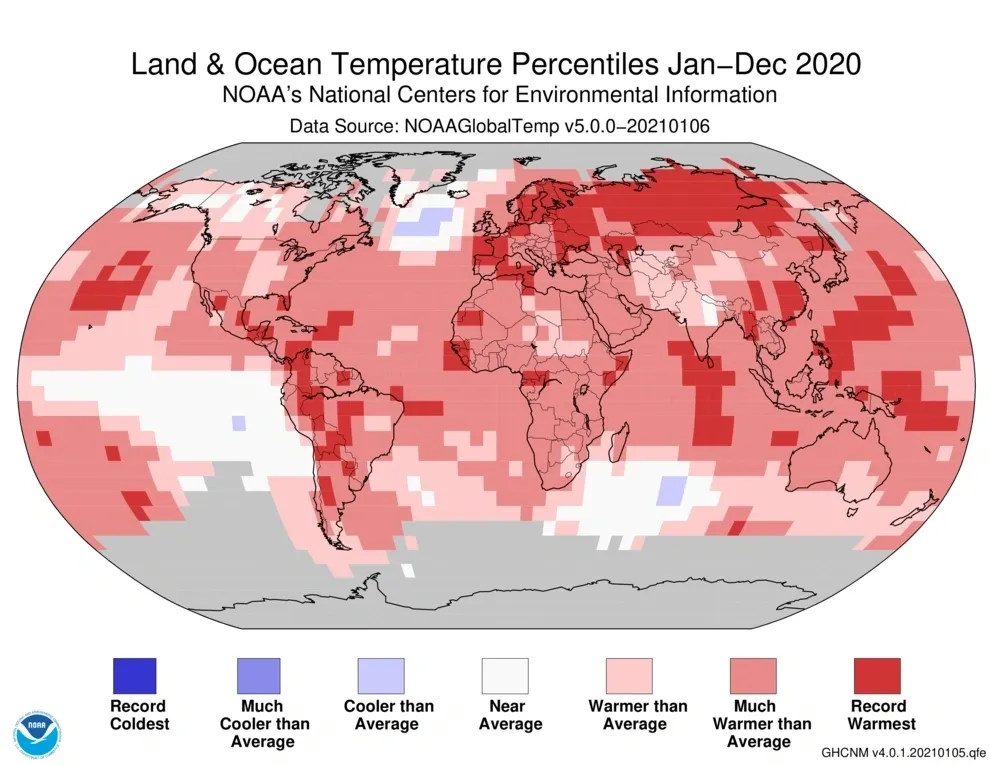
2020 was almost on par with 2016 as the hottest year on record and yet Australia clings to coal and gas.
By Jackie Pearson
Professor Will Steffen of the Climate Council says: “Year after year, decade after decade, temperature records are tumbling due to the burning of coal, oil and gas”.
The National Oceanic and Atmospheric Administration (NOAA) released its Global Climate Report last week, confirming that 2020 was the second hottest year on record globally, just 0.02˚C cooler than the record set in 2016.
“In fact, 2020 virtually tied with 2016 as the hottest year on record when all the global observing agency reports are considered,” Steffen said.
“This is particularly alarming given that 2020 was influenced by a La Niña event, which usually leads to cooler-than-average global temperatures,” he said.
Here are some of the stand-out statements in the 2020 NOAA report:
1. During the year, each monthly temperature for the months of January through November ranked among the four warmest on record for their respective months.
2. The months of January, May, and September were record warm.
3. December had a global land and ocean surface temperature departure of 0.78°C (1.40°F) above the 20th century average—this was the smallest monthly temperature departure during 2020 and was the eighth warmest December on record.
4. The year 2020 marks the 44th consecutive year (since 1977) with global land and ocean temperatures, at least nominally, above the 20th century average.
5. 2011–2020 was the warmest decade on record for the globe, with a surface global temperature of +0.82°C (+1.48°F) above the 20th century average. This surpassed the previous decadal record (2001–2010) value of +0.62°C (+1.12°F).
6. The year 2020 was characterized by warmer-than-average temperatures across much of the globe. Record high annual temperatures over land and ocean surfaces were measured across parts of Europe, Asia, southern North America, South America, and across parts of the Atlantic, Indian, and Pacific oceans. However, no land or ocean areas were record cold for the year.
7. With a slightly cooler end to the year, the year 2020 secured the rank of second warmest year in the 141-year record, with a global land and ocean surface temperature departure from average of +0.98°C (+1.76°F). This value is only 0.02°C (0.04°F) shy of tying the record high value of +1.00°C (+1.80°F) set in 2016 and only 0.03°C (0.05°F) above the now third warmest year on record set in 2019.
The crisis is now
“2021 must be a year for ambitious climate action, and we all need to step up – and fast – to turn this ship around,” Professor Will Steffen of the Climate Council says.
“Clear scientific evidence shows that climate change is rapidly warming our planet, caused by our failure to stop burning fossil fuels and curb rising emissions.
“The past decade (2011-2020) was the hottest on record, +0.82°C above the 20th century average.
“The past seven years in the 1880–2020 record have been the hottest seven on record.
“The 10 hottest years on record have occurred since 2005.
“2020 was the hottest year on record for Europe and Asia. South America had its second warmest year on record.”
In the coming weeks, the Climate Council will launch a new extreme weather report. This report will gather research and observational data from around the world, to summarise what was one of the most intense periods yet for climate-fuelled extreme weather in Australia and worldwide.
“The report clearly demonstrates the costs of our inaction on our lives, health, communities, ecosystems, wildlife, and the economy.
“This report is the next step in our efforts to keep up the drumbeat on the link between climate change and extreme weather, and build pressure on Australia to act,” Professor Steffen said.
“Right now, at just over 1°C of global heating, we are already paying a serious price; the recent Black Summer bushfires, prolonged drought, and the third mass bleaching of the Great Barrier Reef in five years, to name just a few.”
Climate Counsellor Steffen said: “In Australia, our response so far has been woefully inadequate. Without deep and rapid cuts to global emissions, we are on track for 3°C of warming, maybe more. The impacts of this warming would be catastrophic.
“We’ve seen through the pandemic how quickly some governments can act in the face of a health and economic crisis. The climate crisis demands an equivalent response.”
Read NOAA’s whole report here
Help the Climate Council call for swift and decisive action on climate change.


